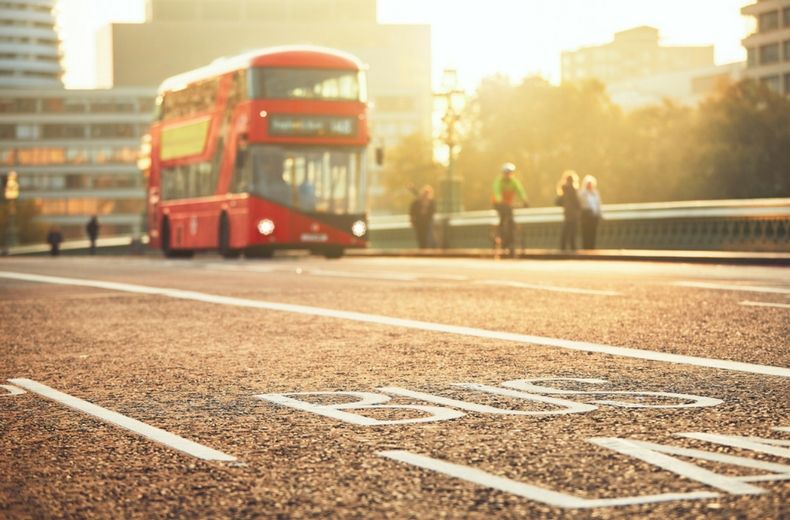While motorists might prefer bus lanes to be car lanes too, by making the bus service faster and more efficient they actually improve the flow of traffic - mainly because people know they'll get where they're going in rush hours quicker on a bus than in a car.
Here we’ll cover everything from how to spot and use bus lanes, to the possible penalties incurred if you’re caught illegally driving in one.
How do you know if it’s a bus lane?
Bus lanes are clearly marked by dashed white lines or a solid white line.
The solid white lines mark out the edge of the bus lane and should not be crossed while it’s in operation.
The dashed white lines signify the beginning and end of the lanes, as well as points where it’s acceptable for vehicles to cross into it – for example to reach a loading bay or to turn left.
They will also have the words ‘bus lane’ frequently marked along the road.
When can’t you use a bus lane?
All bus lanes have blue signs signalling their times of operation, which can vary significantly from road to road. By times of operation, we mean the periods within which only buses can drive in the lanes.
The sign will usually show a time period, and the days of the week when restrictions for other vehicles are to be observed.
Sometimes they’ll show two sets of times (e.g. Mon-Fri 7.30 – 9.30am, 3.30 – 6.30pm).
If there are no times are shown on the sign then the lane is in operation 24 hours a day and can’t be used at any point by unauthorised vehicles.
When can you use a bus lane?
If you’re driving outside a bus lane’s operational hours, then you can use it as long as it’s safe to do so.
This will help ease traffic congestion, freeing up another lane for other vehicles.
Be aware that not using a bus lane when it’s safe to do so during your driving test could result in a marking down, so it's worth being aware of when they aren't in operation.
The bus lane’s blue sign will also show which other road users are permitted to use it.
Who can use a bus lane?
This all depends on the lane in question. While some are reserved entirely for buses (which must have a minimum of 10 seats including the driver), individual signs will signal which other road users may drive in them.
If they display the word ‘local’ then the lane can only be used by local bus services.
The following vehicles may be allowed to use bus lanes at indicated times if they are shown on the sign:
- Licensed London Taxis (Hackney carriages)
- Motorcycles (without side cars)
- Mopeds
- Scooters
- Tricycles (non-motorised, motorised under 450kg, not with side cars)
- Bicycles
What happens if you cross in to a bus lane?
In some circumstances you may be required to cross the solid white line into the bus lane. You should only drive into the lane when you have no other choice but to move over.
These cases could include; to avoid an obstruction in the road, to move out of the path of an emergency vehicle or to avoid an accident.
If you do enter a bus lane you must make sure you leave it again as soon as is safe to do so. Even if you believe you have a legitimate reason to be in the lane you may still receive a fine for doing so - and have to go through the appeals process.
- 11 bad driving habits you should ditch right now
- Penalty Charge Notices - what are they and can you appeal?
- 10 driving habits that are secretly damaging your car
What are the penalties for using bus lanes?
Bus lanes are introduced using Traffic Regulation Orders through powers issued under the Road Traffic Regulation Act 1984 and carry penalties for misuse.
Bus lanes are increasingly monitored by CCTV cameras to record any unauthorised vehicle driving or parking within the operational area.
The recordings are also checked to determine whether the lines may have been crossed in mitigating circumstances (e.g. to make way for emergency services).
If you’re caught using a bus lane during operational hours you could be liable to pay a Penalty Charge Notice (PCN).
A PCN will be sent to the vehicle’s registered keeper containing details of the contravention, vehicle information and photographic evidence.
The amount payable varies across the country – being much higher in the capital and its Congestion Charge zone.
Fines for driving in bus lanes are as follows:
| Full Fine | If paid within 14 days | |
|---|---|---|
| Inside Greater London | £160 | £80 |
| Outside Greater London | £70 | £35 |
Can I appeal a bus lane violation?
If you think you’ve been wrongly penalised, you can appeal against the notice on the following grounds:
- the contravention didn’t occur
- the charge is more than the relevant amount
- a Fixed Penalty Notice had already been issued
- you are not the registered owner/hirer
- the vehicle was being hired out to someone who had signed a statement of liability
- it was being kept by a motor trader
- the vehicle was being used without consent
Be aware that failing to pay a PCN notice could result in your local authority taking action against you.

SALE – up to 40% off*
Roadside & Recovery from £5.29 a month*
• Cheaper than AA Price Promise or we’ll beat by 20%^
• We get to most breakdowns in 60 mins or less
• Our patrols fix 4/5 breakdowns on the spot










